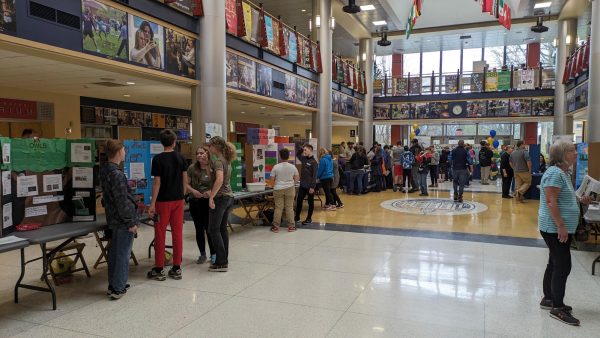ACO talks Food, Faith and Farming
Local dairy farm operator Chris Hemlock joined Allegheny Christian Outreach as a guest speaker on Tuesday, Oct. 18, to discuss not only how his farm is run, but how it changes eating habits and intertwines with his faith as a Christian.
Mollie Little, ACO adviser, gave Hemlock a brief introduction and explained how they met.
“When my kids were little, I was very mindful about what we were feeding them,” Little said. “One day, I saw a business card that talked about raw milk. We started getting raw milk from this other farmer in Meadville and we loved her, but when she got married, she moved and took all of her cows. But by then we couldn’t go back to store-bought milk. So, we discovered another raw milk farmer in Meadville.”
Hemlock grew up in a Christian household, he explained, spending a lot of time in the Meadville’s chapels. Later in life, he dropped out of college to start a construction business and married young, starting both a family and a farm.
However, in the early 2010s, his first wife passed away from cancer. After a year of mourning and focusing on his kids and work, he remarried.
“My current wife was actually a customer who frequently bought milk from us,” Hemlock said. “I was already widowed when we met. And we started talking, and when my sister — who was staying with us at the time — mentioned she was widowed, so we got to know each other.”
Afterwards, he started discussing the logistics of his farm and the sustainability that comes with it.
“What happens in farming is that you put up a fence and you just let the cows eat,” Hemlock said. “By doing that, you’re depleting the resources. You’re not giving the grass time to regrow. And there are other plants that are stronger that the cows eat, but they have parasites. And then you have to give the cows antibiotics because they’re sick. It’s like a growing snowball of issues.”
These issues are something that Hemlock wants to prevent. He has a large focus on the cows’ well-being. Aside from that, he puts a lot of focus on raw — unpasteurized — instead of processed milk in order to focus on the customer’s health instead of profits.
“I believe that the processing of foods has generally benefited longer shelf life and the store, but not necessarily the person who’s buying it,” Hemlock said. “So I feel that if we can provide food that is less processed, the nutrients that are there will not be diminished.”
Hemlock also went into further detail about the economics of his farm. His costs are lower technically because the farm is not buying grains because he runs a grass-fed farm. Time-wise, because of his decisions to provide raw milk and to prioritize the cows’ health, the farm does not provide meat as quickly as other dairy farms. Instead of the conventional two months, it takes about two years.
“We want to build a healthy animal so that we have a healthy customer,” Hemlock said.
Following his presentation, a Q&A session opened up. Conversation centered more on his faith and how it integrated into his work and lifestyle.
“One thing that definitely stood out to me was the way he integrated his faith into his work,” said Rebekah Rudd, ’25.
Upon being asked about how God’s character manifested through his work, Hemlock answered, “I see him as a provider. Sometimes you don’t have enough grass, or the grass is too dry, but it always turns out alright. And although I’ve been my own boss my whole life, the only real boss I have is the Lord because only he controls the outcome of crops.”
Following the presentation, Little revealed two loaves of banana bread she made and two gallons of Hemlock’s milk. This gave a chance for club members and leaders alike to catch up and reflect.
“I feel like I saw connections between the sustenance we get from food and the sustenance we get from the Lord, and that life through death is always present,” Danielle Gibson, ’26, said

Elanor Bonta is a first-year from Shanghai, China. She is majoring in psychology and minoring in biology.






